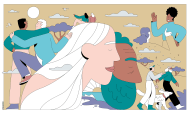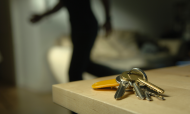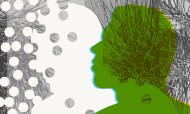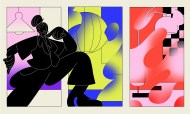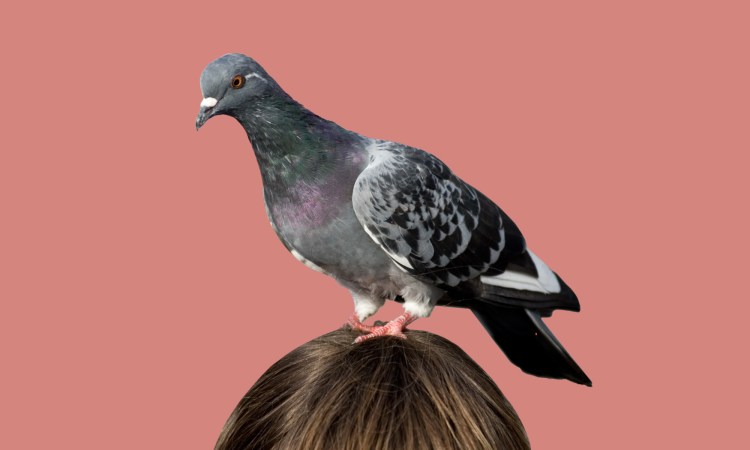
Before you answer “Yes!” — look at these three quick scenarios. And if you find out you’re a bit bird-brained, remember: intelligence is all relative, says psychologist Ben Ambridge.
What makes humans special? What makes us different from animals? After reviewing many studies of both humans and animals, my conclusion is: less than you might think. While we may not choose to call them civilizations, many animals — from chimpanzees to chickens — live in groups with a clearly defined pecking order and display many kinds of abilities. Ants and bees will give you a good run for your money on tests of route-planning and puzzle-solving; starlings “make music” in that their songs are constructed around the same scales as most traditional Western compositions, and abstract thinking is shown by crows, squirrels and box turtles in tests that involve using patterns or rational inferences to figure out the location of a tasty treat. Whether or not other animals can learn human language is a long-running debate, but many — dogs in particular — can learn an impressive number of individual words. And while it might be a stretch to call it science and engineering, chimpanzees are one of a number of animals who can use tools: they’ve figured out how to ant-dip (use a shoot as a spoon to pick up ants) and termite-fish (use a thin twig as a rod to catch termites).
Of course, nobody is denying that humans can do plenty of things that other animals can’t. All I hope to persuade you is that, in the words of Charles Darwin, the difference is “one of degree and not of kind”: the same abilities that allow starlings to sing, parrots to count and fish to find their way home allow humans to write symphonies, do calculus and invent Google Maps. We don’t do anything different from other animals; we do the same things, only better. While the below tests might sound a little frivolous, they have a firm scientific basis and they’re based on peer-reviewed articles from reputable academic journals. By exploring the similarities and differences between humans and other animals, we can begin to understand when and how our abilities, our likes and dislikes, and even our foibles and mental blind spots arose in the course of evolution. Now get set to pit yourself against a pigeon in three short scenarios. After answering all them, you’ll see the answers.
Scenario #1: Two many phones!
You’ve just saved up to buy a fancy new phone, and you had to really put in the hours in a part-time job (which you hate) but it was worth it. You place your order online, and the phone arrives first thing in the morning. That afternoon, an identical phone arrives. You contact the company, and — after keeping you on hold for an hour and failing to phone you back twice — a representative says the system can’t process a return and, in fact, you’d be doing the call center a favor if you just kept the phone. You agree and decide to treat your brother, whose birthday is coming up and whose current phone is all but unusable. But which of the two still-shrink-wrapped phones do you give him?
- The first one
- The second one
Scenario #2: Band-aid, please
Three months ago you bought a $190 ticket to see one of your favorite bands. Then yesterday, your #1 favorite band announced a new tour, and you snapped up a $125 ticket. In your excitement, you forgot to check the dates and — you guessed it — the shows are on the same night. You can’t sell either ticket: both bands are so obscure that their gigs never sell out, and everyone you know hates them. Which do you attend?
- The $190 gig
- The $125 gig
Scenario #3: Don’t be a mug
You want to buy some cool vintage coffee mugs and the more mugs the better (you hate washing up and have big cupboards). You go to a flea market. One seller has a box of 20 mugs, though three have nasty chips and two are missing handles. Another seller is offering, for the same price, a box of 12 intact mugs. You can’t buy both because — oh, I don’t know — the two sellers hate each other and each won’t deal with you if you’ve bought off the other. From whom do you buy your mugs?
- First seller
- Second seller
Answer #1: Two many phones
Well, there are no right or wrong answers here; the whole point is that it makes no difference. But, if this happened for real, I bet you’d give your brother the second free one, wouldn’t you? If so, you are showing a justification of effort effect: you value things that you have to work hard for much more than (identical) things that come cheap or for free. But in cases such as this one, this is a logical fallacy: it makes absolutely no difference which phone you give away and which you keep.
Pigeons show the same fallacy. Take pigeons that are trained to know both a red key and a green key give two seconds of access to grain when pecked. The clever part is that, in order to access the red key, the pigeons need to give one peck on a white key; but in order to access the green key, they need to give twenty pecks on the white key. Finally, pigeons are given a free choice — without needing to peck on the white key at all — between the red and green key. Which key do they prefer? Yes, the one that they usually had to work hard to get, even though, just as with the two phones, the results are exactly the same, two seconds of access to grain.
Answer #2: Band-aid, please
This time, there is a right answer: you should just go and see your favorite band. If you decide to go to see the other band, you are showing a sunk cost effect. Having already sunk a lot of money into the ticket, you can’t bear to waste it. Again, this is a fallacy. The past is gone forever whatever you do, so just go to the gig you’ll prefer.
Again pigeons (and also starlings) show the same fallacy. Suppose a pigeon has already pecked ten times on a green key. Now, in order to earn its food reward, it must give either another twenty pecks on the green key or ten new pecks on a red key. Even though it could save itself ten pecks worth of effort by switching to the red key, the pigeon prefers to stick with the green key, so as not to waste the ten pecks that it has already sunk into this key.
Answer #3: Don’t be a mug
The first seller is, in effect, offering 15 mugs, whereas the second is offering 12 mugs for the same price. You would be crazy to go with the second seller. If you did so, you are showing the less is more effect (thinking you’re getting more value by getting fewer pristine mugs). Again this is a fallacy. Less is not more. More is more. The fallacy arises because people tend to average over the whole set when making their judgement. For example, in one study, participants guessed that a hamburger had 734 calories but that a hamburger plus three sticks of celery (the saddest Happy Meal I’ve ever seen) had only 619 calories (and, no, they didn’t think that eating a stick of celery burns calories).
And pigeons again show the same fallacy. When given the choice between a pea alone and a pea plus a piece of milo (a relatively unappetizing grain), pigeons choose the pea — unless they have been starved beforehand, in which case they go for the meal deal. Similarly, dogs will choose a piece of cheese over a piece of cheese plus a bonus carrot, and macaques will choose a grape over a grape plus a bonus green bean. It’s not that they hate the milo, pea, carrot or green bean — they’ll eat it if that’s all that’s on offer — it’s just that pigeons, dogs and monkeys, like humans, sometimes think that less is more.
How did you do overall? Did you beat the pigeons? Probably not. The point of these studies was to show that pigeons show the same logical fallacies that are known to be widespread in humans. Why do we share these fallacies? Nobody knows for certain, but Thomas Zentall, who published a few papers that summarized these studies (and inspired another), has some suggestions. If an animal places more value on food that it has had to work hard for (justification of effort), then that may motivate it to persist longer when looking for food. Sunk cost effects may arise from the fact that, once you’ve got a food source you’re relatively happy with, moving seems unnecessarily risky, and this conservatism spills over into choices where there is in fact no such risk. Less is more effects look puzzling to humans, but remember that most animals can’t count (or, at least, not very well). This means that, often, the best they can do is judge the overall average quality of two rival sources of (mixed) food, rather than work it out piece by piece.
If you made the same choices as pigeons, try not to feel so bad. Darwin was right: when it comes to the differences between humans and other animals, everything is relative and everything is a relative: we are all part of one big family.
Excerpted from the new book Are You Smarter Than a Chimpanzee? by Ben Ambridge. Copyright © 2017 by Ben Ambridge. Reprinted by permission of Profile Books, Inc. All rights reserved.



